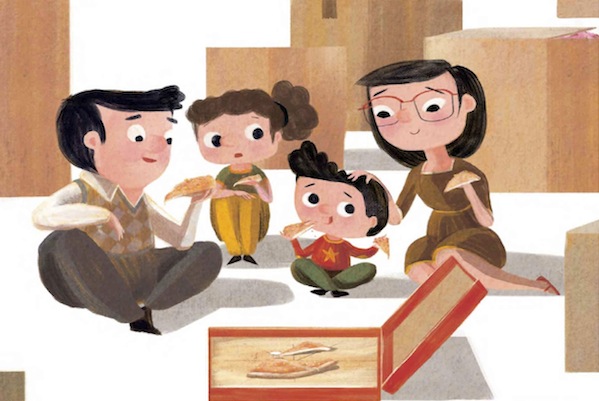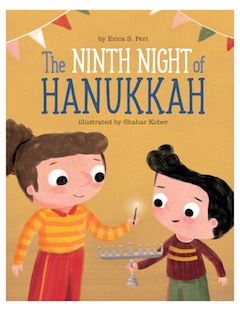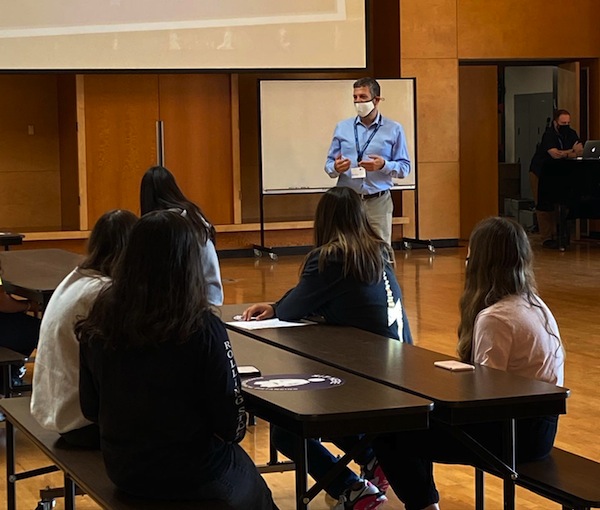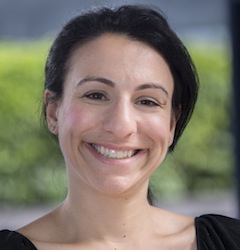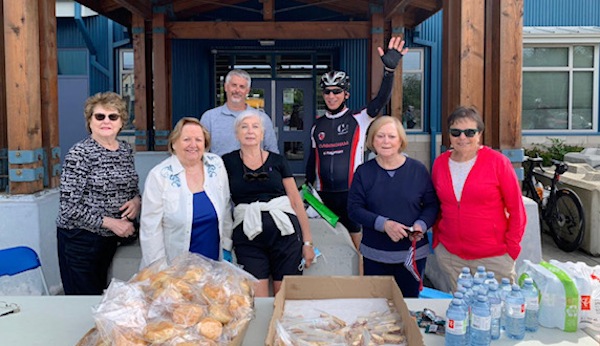Yehuda Barkan and Nitza Shaul co-star in the charming Love in Suspenders. (photo from homemcr.org/film/love-in-suspenders)
The Vancouver Jewish Film Festival is set to go online March 4, and all the many offerings will be available until March 14. There are plenty of gems for viewers of varying tastes and ages, including a few Israeli films that seem to be nostalgic paeans to American comedies or kids’ movies of the 1960s and 1970s. But we start with romance.
The film Love in Suspenders opens with a wild car ride through Tel Aviv, as we are introduced to main character Tammy (Nitza Shaul) who drives like … well, an Israeli. When she backs into pedestrian Benno (Yehuda Barkan), this adorable slice-of-life gets rolling.
Her son Michael, a lawyer, warns that one more infraction will lead to the loss of her driver’s licence. Making nice with her victim (while continuing to argue it was his own carelessness that led to the mishap), Tammy begins what evolves into an innocent and unintentional courtship with Benno.
The luxurious seniors facility where Tammy lives is a hotbed of sexual tension – with lectures on the wonders of Viagra, a supporting character in the film that really should have received its own credit.
Tammy venerates her late husband Yoni in ways that probably exceed what would be considered normal grieving. Hanging on to her glorious past – Tammy and Yoni were a musical duo that toured Israel and abroad – versus facing an exciting but unnerving new romance is the conflict that drives her character.
Benno’s character is driven by all sorts of unnerving situations. Benno’s got his own problems with the next generation, but both he and Tammy handle their affairs like adults, despite being treated like children by their kids.
Michael’s horror at both his mother’s rekindled sex life and the uncertain provenance of the unkempt and possibly homeless Benno threatens to undermine the trajectory of their affection.
Kids aren’t the only interfering forces. The extravagant dining hall and luxurious hallways of the seniors home are brimming with prying eyes and wagging tongues. The roosters in the facility are put out that Tammy has scored a love interest from the outside, despite all their strutting and preening. The women in the building always seem to be nearby when Tammy’s male caller is coming or going from her apartment.
The title Love in Suspenders is a play on the phrase “Tuesdays in suspenders,” a program in which Israeli seniors get weekly discounts at venues like the cinema. The movie is an absolutely charming vignette of finding love at a later age and dealing with the impacts of a fresh future on a cherished past. It is a respectful treatment of older characters and their romantic explorations, which are topics too often treated shabbily by Hollywood and other depictions.
– PJ
***
Not one of us will be able to avoid death. Yet, despite its inevitability, few of us prepare for dying and most of us put the thought of it to the back of our minds, even as we mourn those who have died.
The hour-long documentary Dying Doesn’t Feel Like What I’m Doing is almost a must-see for anyone struggling with the reality of mortality. It is a caring portrait of Rachel Cowan’s 18-month journey from a cancer diagnosis (a brain tumour) to her passing. Along the way, we learn about how remarkable this human’s life was and how her impacts continue. However, while Cowan was successful by almost any measure, it is not only her accomplishments that are noteworthy, but her struggles and her finding of strength in love and gratitude at her most vulnerable, when she had every right to be bitter and selfish.
Cowan was a civil and women’s rights activist of some acclaim. She was married to Paul Cowan, a journalist for the The Village Voice, and theirs was a partnership that extended into work at times; she took incredible photographs for his stories, capturing on film the best and worst of humanity in a tumultuous era. The couple lived and fought for their beliefs and really did make the world a better place.
Paul died from leukemia in 1988, at 48 years old. Rachel had converted to Judaism earlier in their relationship, after his parents died in a horrific apartment fire. The tragedy spurred Paul to explore his Jewish roots and her to search for God and meaning, which led her to Judaism. She was studying to become a rabbi during the period that Paul was ill and she was ordained soon after his death. At that point, still deep in grief, she thought, “Now, what?” How possibly could she counsel others when she herself was so ungrounded. She decided, “Choose life.”
She not only chose life for herself, but for others. While working at the Nathan Cummings Foundation, she established the Jewish Healing Centre, after seeing how little Jewish community support Paul had had in palliative care. She also established other initiatives and wrote a book on wise aging. As the documentary begins, we see Rachel leading a meditation group, continuing her life’s work. The film’s title comes from a comment Rachel makes about nine months after her diagnosis: “I’m living my life. Dying doesn’t feel like what I’m doing.”
– CR
***
With a harrowing opening scene, A Starry Sky Above the Roman Ghetto begins an historical back and forth between the terrible past and the present. The intertwined timeframes and eventual plot twists remind the viewer that the past is not really past.
Roman high schooler Sofia (Bianca Panconi) finds a Second World War-era letter and photograph hidden in the lining of a flea market suitcase. Her curiosity piqued, she begins a quest to uncover the story behind the mystery, which forms the narrative of the film.
Bringing the artifacts to her schoolmates, who enthusiastically join in the sleuthing, Sofia and pals then recruit students from the neighbouring Jewish high school to join in the mystery-solving.
There is charm in the cross-cultural friendships and some minimal tension when the teens meet obstruction from their parents and teachers. But the film is generally simplistic, too often cutesy and frequently hammy.
Before they have even tracked down the basics of the historical mystery, the students decide to turn their quest into a play. The movie itself has the feel of a high school production, and the fresh-faced, upbeat teen spirit seems incongruous with the Holocaust narrative at the heart of both the theatre production and the film. Impediments are too easily overcome. Archival research eurekas far too effortlessly and speedily fall into place. (The way the characters manhandle historical documents would make an archivist recoil.) An ostensible Montague/Capulet hurdle to a pair of star-crossed lovers is resolved in the most facile manner imaginable. The ending is unbelievably tidy – unbelievable being the operative term.
Continuity and fidelity to peoplehood and identity are core themes, but even these are handled poorly. For example, a Jewish boy gives Sofia a convincing explanation for why he must date and marry only a Jewish girl, but the next day he apologizes, apparently deciding that maybe continuity isn’t as sacred as a little amorousness after all.
The resolution to the larger mystery falls very close to home for Sofia, whose own life is altered by her discovery. This outcome provides some justification for the girl’s otherwise inexplicably dogged devotion to unraveling the mystery. But the whole thing has more of a Scooby-Doo vibe than the solemn drama the film probably set out to create.
There is some eye candy in the form of Roman architecture, including parts of the city’s Jewish quarter, but it is perhaps a thwarted COVID-era wanderlust to blame for finding fault that the film is not more of a visual celebration of the eternal city.
There is some decent acting and there are enjoyable components to A Starry Sky Above the Roman Ghetto, but it is hard to sustain the premise of an historical mystery when every twist and turn is foreseeable long before the ostensibly bright students clue in.
– PJ
***
Fans of Airplane, Naked Gun and Austin Powers will settle right in with the ridiculous Israeli comedy Mossad. Upending the perception of the Israeli intelligence agency as one of the world’s greatest, the film centres on what must be Mossad’s most moronic agent.
The action begins with the kidnapping of the world’s foremost tech magnate, Jack Saterberg, while he visits Israel. (One doesn’t have to stretch the imagination much to conjure a mashup of Twitter’s Jack Dorsey and Facebook’s Mark Zuckerberg). It falls to Mossad operative Guy Moran (Tsahi Halevi) to team up with CIA agent Linda Harris (Efrat Dor) to confront the bad guys.
When Mossad hit Israeli theatres in 2019, it saw a box office-smashing open. It is an all-ages bit of entertainment, with slapstick buffoonery and sight gags – and not really a lot more. There is certainly plenty of violence, but it is exclusively of the cartoonish variety.
In addition to sight gags, smartass dialogue drives what there is of a direction to the story. “I’m a Mossad agent. Here’s my card,” Moran says. “It’s blank,” replies the recipient. “I’m a secret agent,” he says. Nyuk nyuk nyuk.
The kidnappers threaten to stop all cellphone service worldwide. When they offer a two-minute taste of the threat, global mayhem and violence ensue, underscoring the urgency of preventing the calamity. Suffice to say the only real tension in the 90 or so minutes comes from bracing for the next corny gag.
All the predictable scenarios are packed in – like a countdown clock to doomsday and other tenets of the genre – but in the most outlandish forms. Romance also figures, with Israeli-Israeli, Israeli-American and human-machine flirting adding spice and disorientation befitting a script that seems to view no joke as too absurd if there’s a chance of a laugh.
For a harmless multigenerational movie night, Mossad will deliver a few side-splitters and a lot of snickers.
– PJ
***

Sky Raiders is pure family fun. In Hebrew with English subtitles, the audience needs to be old enough to read, but not even that well, as the action is pretty easy to follow. For the parents who may have watched The Love Bug when they were a kid, there will be a comforting sense of familiarity with Sky Raiders, though the historic plane that gets rebuilt in this movie isn’t anthropomorphized and the love story in this case is between the teens.
Yotam (Amir Tessler) is the new kid at school and has trouble fitting in. When he spots Noa (Hila Natanzon) playing soccer with a group of boys, and holding her own, he is smitten. He joins the game but soon requires medical attention for an asthma attack, having left his inhaler at home, despite his over-protective mother’s multiple reminders for him to take it with him; his father, a pilot, died a few years earlier in a plane crash. Noa has her own parental problems – her father, also a pilot, has dismissed her as, basically, “just a girl” – and her older brother bullies her.
The two teens share both the love of all things planes and flying, as well as parents who actively try to dissuade them from these loves. They find their father figure in the grumpy old man dubbed “Mad Morris” by the local kids, who, surprise, is a really nice guy, just sad and lonely.
When Yotam and Noa discover a Messerschmitt that had been left to rot in a plane cemetery, the two – with Morris’s help – set to restore it. And, not only to restore it so that it can sit in a museum, but so that it can actually be flown in the upcoming annual Yom Ha’atzmaut airshow.
With some cheesy CGI, young love conquering all, bullies put in their place, the ostracized taking front-stage, and happy parent-child reconciliations, Sky Raiders is Disney-esque and charming. Cue the music to swell, as the credits begin.
– CR
For tickets to the film festival, visit vjff.org.


